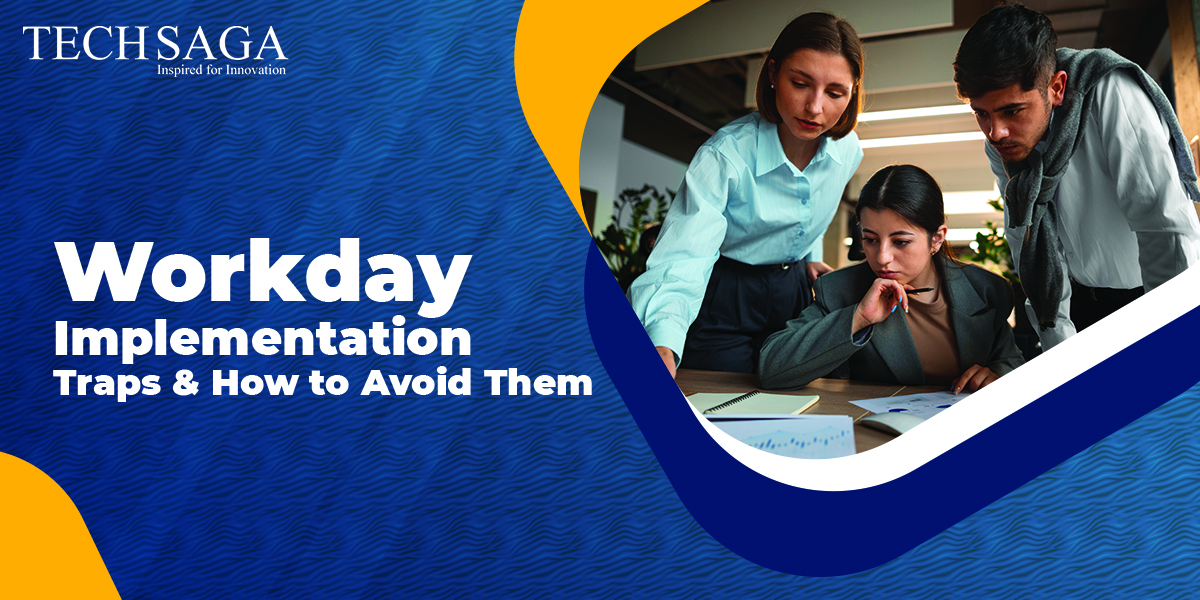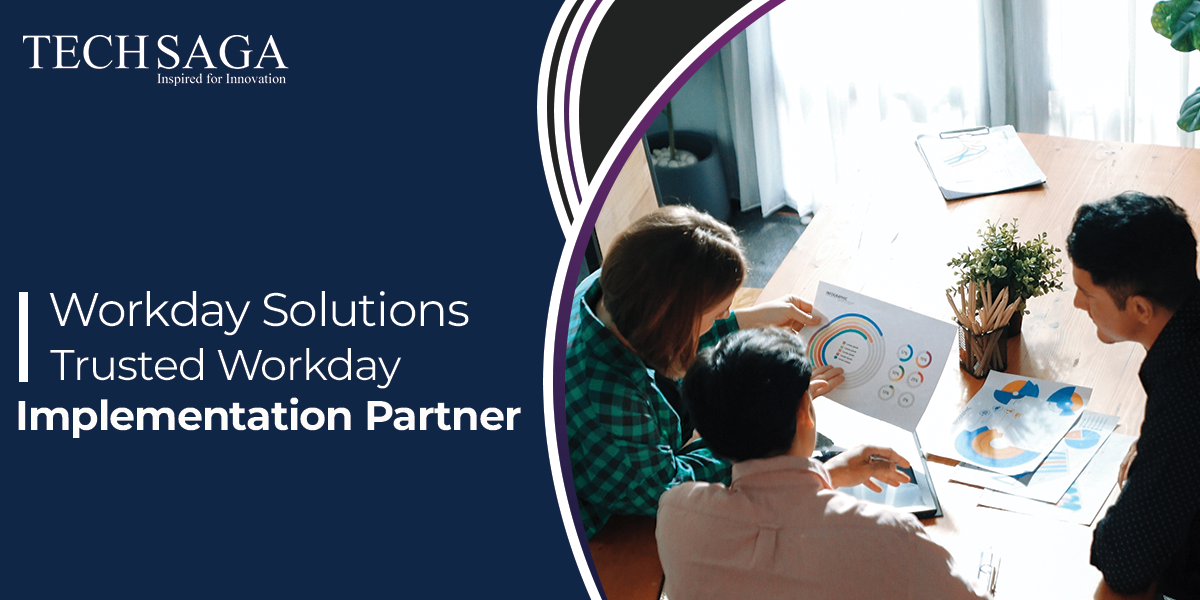Techsaga USA
Get valuable insights and stay updated on our interesting Techsaga US blog. We are experts in the world of IT consulting and IT support.
What Are the Key Roles in Workday Implementation?
Executing Workday, a major enterprise software for human resources and financial management, is truly a complex activity that requires intense plans and intense collaboration with accomplished professionals. The success of the Workday implementation depends on a team of skilled and experienced professionals with clearly defined roles and responsibilities. From planning and integration to training and post-go-live support, the team must work together to manage all these aspects of the project. Moreover, partnering with experienced Workday implementation partners is essential to tackle the obstacles a user may encounter when transitioning to use and maximizing the potential of the platform. Their expertise will guide every process associated with your smooth and efficient implementation.
This article outlines the key roles essential for an effective Workday implementation. Therefore, ensures a smooth, seamless transition and optimal utilization of the platform.
Roles Responsible for the Smooth Workday Implementation
Key roles and responsibilities for the smooth workday implementation include:
1. Executive Sponsor
The Executive Sponsor plays a pivotal role in aligning the Workday implementation with the organization’s strategic objectives. This individual is responsible for securing necessary resources, facilitating decision-making processes, and providing overarching support to the project team. Their active involvement ensures that the project maintains its strategic focus and receives the attention it merits from all organizational levels.
2. Project Sponsor
Serving as the bridge between the Project Manager and the Executive Sponsor, the Project Sponsor ensures that the project aligns with business goals and that any obstacles are addressed promptly. They oversee resource allocation, and budget management, and support the Project Manager in steering the project toward successful completion.
3. Project Manager
The Project Manager is tasked with overseeing the entire implementation process, ensuring that the project adheres to its timeline and budget. This role involves coordinating between various stakeholders, managing risks, and ensuring that the project team works cohesively towards the common goal. Experience in managing Workday projects is crucial, as it equips the Project Manager with insights into the platform’s intricacies and potential challenges.
4. Integration Lead
The Integration Lead focuses on ensuring that Workday integrates seamlessly with existing systems within the organization. This role requires a deep understanding of both Workday and the organization’s current IT landscape to facilitate smooth data flow and system interoperability. Effective communication skills are essential, as the Integration Lead must translate technical concepts for non-technical stakeholders.
5. Functional Leads (Subject Matter Experts)
Functional Leads are experts in specific areas such as Human Capital Management (HCM), Financial Management, or other relevant domains. They provide invaluable insights into current operations, help design processes within Workday, and ensure that the system meets the functional requirements of the organization. Their expertise ensures that Workday’s capabilities are fully leveraged to meet the organization’s specific needs.
6. Data Conversion Lead
The Data Conversion Lead is responsible for migrating existing data into the Workday system. This role involves meticulous planning and execution to ensure data integrity and accuracy during the transition. Given the sensitive nature of the data, this role is crucial for maintaining compliance and security throughout the implementation workday process.
7. Testing Manager
The Testing Manager oversees the testing phase of the implementation, ensuring that all components of the Workday system function as intended before going live. This includes developing comprehensive testing plans, coordinating testing activities, and addressing any issues that arise during this critical phase. The role of testing managers in spotting and resolving possible problems further guarantees a faultless system that satisfies all standards.
8. Change Management Lead
Introducing a new system like Workday necessitates effective change management to ensure user adoption and minimize disruptions. The Change Management Lead develops strategies to manage the organizational changes accompanying the workday implementation, focusing on communication, training, and support to facilitate a smooth transition. They help in the easy transition for employees. Further ensures that employees feel supported and proficient in using the new system.
9. Workday Architect
The Workday Architect is crucial in designing and integrating systems, creating a technical blueprint that facilitates a smooth transition to Workday’s platform. They play a key role in aligning Workday’s functions with the current IT infrastructure. Therefore, making sure that the new system improves organizational operations without interfering with existing systems. Their knowledge not only helps achieve a seamless integration but also ensures that Workday’s features are fully utilized to address the organization’s unique requirements.
10. Workday Developer
Workday Developers handle API management and develop custom integrations, which are crucial for the technical side of the implementation process. Their efforts guarantee that all components of the Workday system interact smoothly, facilitating a consistent data flow and overall system performance. This is vital for establishing a highly efficient and tailored Workday environment that aligns with the unique requirements of the organization.
11. Workday Quality Assurance (QA) Analyst/Tester
Workday QA Analysts/Testers are essential during the testing phase. They thoroughly perform both unit testing and parallel testing to ensure the system operates as expected before the go-live date. Their careful efforts in spotting and addressing potential problems, help guarantee that the system functions flawlessly and meets all outlined requirements. This commitment is vital for ensuring a successful transition and a seamless rollout. Therefore, offering reassurance to all stakeholders involved in the Workday implementation project.
12. Workday Training Coordinator
The Workday Training Coordinator creates thorough training materials and programs designed to teach users about the new Workday system. Their efforts are essential for maximizing the return on investment in Workday. Therefore, making sure employees are prepared to use the system both efficiently and effectively. By offering in-depth tutorials, interactive workshops, and ongoing learning opportunities, users can build their confidence and skills in using the new platform.
13. Workday Security Specialist
Workday Security Specialists ensure the platform complies with data protection laws and adheres to internal policies on information security. They establish a secure workday environment to safeguard sensitive data against any unauthorized access or breaches.
To Conclude
The successful workday implementation depends on effective teamwork and the abilities of a carefully set up and well-defined roles team. From leadership to technical delivery, every role plays its part in making the transition swiftly and in the most effective way to utilize the system. Working with the Workday implementation partners smoothens things out and helps organizations address each challenge effectively.
With the right team and strategy, the implementation of workday drives significant organizational growth and efficiency.




